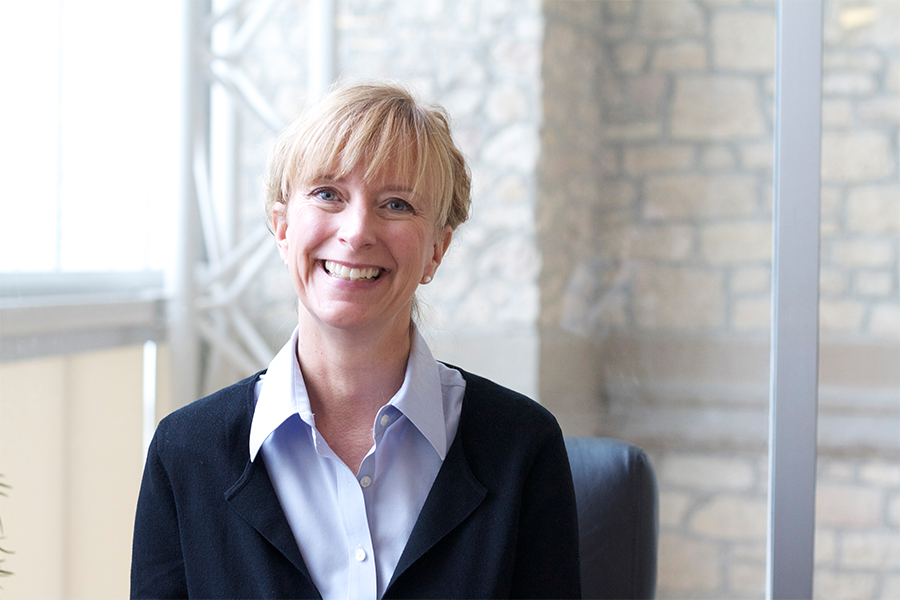The charter, explained Patti McDougall, vice-provost of teaching and learning, developed by the Teaching, Learning and Academic Resources Committee and reviewed by University Council, sets out the roles of everyone involved, from students and advisors, to faculty and peer mentors.
"We needed to outline for students what we expect of them and what they can expect of us," explained McDougall. "We want more students to spend time with our academic advisors because we know it makes a big difference in their success."
Complementing the renewal of academic advising at the U of S is DegreeWorks, an online program that tracks a student's degree progress and matches that with degree requirements.
This software, McDougall explained, shifts the role of academic advisors from one of "telling students what course they still need to take to talking about academic and career goals and what they see themselves doing in five to 10 years. They can help students figure out the most effective and efficient route to get where they want to be."
Another significant change, she continued, is the number of academic advisors on campus. "Pretty much every college has academic advisors in place, as do central units like the Language Centre and Disability Services for Students."
Because of the extra advisors, this means students can often "drop in and get immediate advice and then schedule further appointments."
While McDougall encourages students to speak with academic advisors because of the expertise and training they have, she also stressed the important role that faculty play as mentors.
"Our model puts an emphasis on academic advisors and using faculty mentors later in the student pathway. Faculty are well-positioned to give advice on potential careers, grad school, whether to do a thesis and what to expect within a discipline."
Certainly, great strides have been made in academic advising, said McDougall, but it is all for naught unless the services are used.
"Students are responsible for seeking advice; it's part of the educational experience," she said, adding that the Advising Charter was modeled after the university's Learning Charter that outlines the students' role to "learn actively, think broadly, act ethically and engage respectfully."
McDougall is certain that those students who seek out academic advising service will not be disappointed.
"Our academic advisors play a professional role in the educational experience. Students can develop relationships with the advisors over the course of their degree and that makes all the difference in academic and career success."
Read the advising charter here.
"We needed to outline for students what we expect of them and what they can expect of us," explained McDougall. "We want more students to spend time with our academic advisors because we know it makes a big difference in their success."
Complementing the renewal of academic advising at the U of S is DegreeWorks, an online program that tracks a student's degree progress and matches that with degree requirements.
This software, McDougall explained, shifts the role of academic advisors from one of "telling students what course they still need to take to talking about academic and career goals and what they see themselves doing in five to 10 years. They can help students figure out the most effective and efficient route to get where they want to be."
Another significant change, she continued, is the number of academic advisors on campus. "Pretty much every college has academic advisors in place, as do central units like the Language Centre and Disability Services for Students."
Because of the extra advisors, this means students can often "drop in and get immediate advice and then schedule further appointments."
While McDougall encourages students to speak with academic advisors because of the expertise and training they have, she also stressed the important role that faculty play as mentors.
"Our model puts an emphasis on academic advisors and using faculty mentors later in the student pathway. Faculty are well-positioned to give advice on potential careers, grad school, whether to do a thesis and what to expect within a discipline."
Certainly, great strides have been made in academic advising, said McDougall, but it is all for naught unless the services are used.
"Students are responsible for seeking advice; it's part of the educational experience," she said, adding that the Advising Charter was modeled after the university's Learning Charter that outlines the students' role to "learn actively, think broadly, act ethically and engage respectfully."
McDougall is certain that those students who seek out academic advising service will not be disappointed.
"Our academic advisors play a professional role in the educational experience. Students can develop relationships with the advisors over the course of their degree and that makes all the difference in academic and career success."
Read the advising charter here.
